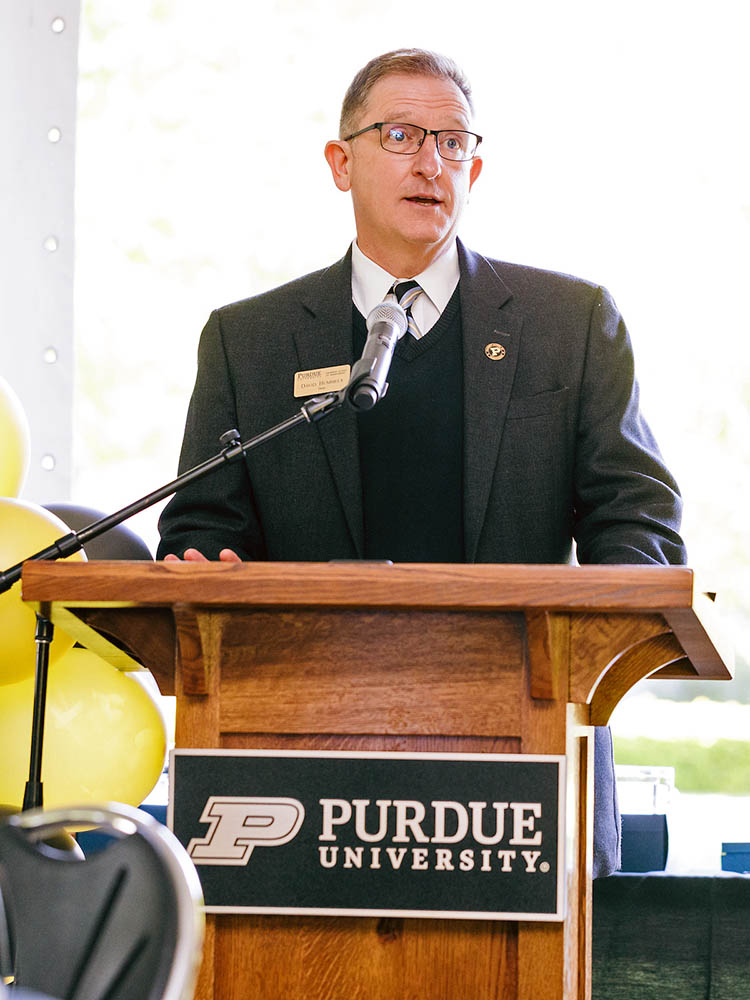
All business schools struggle with preparing students to be job-ready after graduation and also preparing them for a career trajectory that, these days, will last not 20 or 30 years but 50 or 60 years, David Hummels says.
“There’s an important balance to be found between giving students highly specific skills that make them effective from day one in an internship, day one on the job, with a broader perspective of problem solving in a multifunctional context,” says the Dr. Samuel R. Allen Dean of Purdue University’s School of Business.

The business school finds that balance in its curriculum, Hummels says. But the crucial art of preparing undergraduates for their professional lives should build upon curriculum. It requires dedicated staff, robust technologies, and school-wide devotion.
Doubling down on its promise to best prepare undergraduates for their futures, our school created CareerBound. Housed in the school's professional development center, the program was rolled out in fall 2021 after a successful pilot in 2020, and signals a heightened commitment to aligning the skills business students learn during their undergraduate years with the skills employers are looking for in new hires.
In his many conversations with CEOs, company vice presidents, and hiring managers about what they look for in new business school graduates, Hummels found they don’t focus on a degree program’s plan of study.
“No one says ‘I need someone who knows finance, marketing, accounting’ — they assume our students will have been taught and learned that,” he says. “We wouldn’t have given them a degree otherwise.”
Business leaders want people who can communicate effectively, who can lead teams, who thrive in diverse environments, and who can address large questions that will inform corporate strategies. They want employees who can help solve the biggest challenges a company will face, Hummels says.
The most innovative business schools are amplifying their career services to meet employers’ expectations and needs.
“There is a growing awareness that we need more than just academic knowledge to be successful,” says CareerBound Director Sarah Ratekin. “Historically we've called these ‘soft skills’ or personal development skills, but the truth is for our students and really any professional to be successful we need to be proficient in interpersonal skills.”
The CareerBound program is a door to understanding and engaging with coveted competencies in individualized, meaningful, and manageable ways, Ratekin says.
CareerBound focuses on the eight National Association of Colleges and Employers (NACE) competencies: career and self-development, communication, critical thinking, equity and inclusion, leadership, professionalism, teamwork, and technology. NACE is a professional organization that connects college career services staff and employers who are hiring students. The group says it is the leading source of information on the employment of the college-educated.
The NACE career competencies are skills that have shown time and time again to be the real differentiators for students looking for employment as well as long-term career success, Ratekin notes.
“These competencies are important for a candidate to display in the recruiting process,” says Maggie Rochford of biotechnology research company Roche. The business school alumna says all NACE competencies are important but points to teamwork as a critical skill at Roche.
“When I was interviewing this fall for potential interns, I wanted to ensure they could be a team player because our organization is rooted in cross-functional collaboration,” Rochford says.
WHAT ARE THE CAREERBOUND COMPETENCIES?
“There are lots of things happening on campus. It can be really complicated for students to know what to do and why they should engage with those experiences,” Ratekin says. “CareerBound helps students create a personalized development plan — kind of like a personalized mental fitness approach — that is scalable and truly designed for the individual who’s participating in the program.”
The program starts with defining success, Hummels says. Students are made aware of the career competencies and their importance.
“Then, we assess the students. We engage in what you might call a 360-degree review,” Hummels says. “How is the individual student performing in the areas of teamwork, communication, leadership and so on?”
Students are then prompted with opportunities to improve. They are reassessed at appropriate intervals. This all takes place, Hummels notes, with the support of a robust team consisting of an academic advisor, career coach, alumni mentor, and faculty.

Hummels, a Distinguished Professor of Economics, is excited about the faculty involvement.
“Many of the professional competencies that we’re looking to develop can be found in coursework that all of our students take. We are working with faculty to brand their syllabus,” he says. So, when a career competency is addressed in coursework, it’s indicated on the syllabus. Students will come to look for it, he says.
As a CareerBound intern and early adopter of the program, Daniels School general management major Megha Shastry works to help fellow students increase their engagement with “real-world skills such as communication, professionalism, critical thinking, and diversity, equity and inclusion. This can be very daunting to go into, especially for freshmen,” she says.
“That’s why CareerBound is an app, because that’s how students engage,” she adds.
Students download the app and are introduced to activities and campus events that develop different competencies. Users earn points when completing activities, and can earn badges and prizes when certain levels are met.
"CareerBound is teaching me that career readiness is about more than just having experiences on a resume," Shastry says.
In offering CareerBound to students, we partner with several platforms, notably Suitable and SkillSurvey. Suitable is the main CareerBound app — students access it easily on their smartphones with their Purdue login.
“That makes it really easy to find opportunities to develop skills and earn points and prizes along the way,” CareerBound Director Ratekin says.

“So, for example, if a student wants to focus on communication skills, there are literally hundreds of experiences on campus that would help them develop those skills. They can identify what those opportunities are, when they’re happening, and how they fit into their schedule,” she says.
SkillSurvey provides assessments of talent and uses the eight NACE competencies in its evaluations, making it a perfect match for our program. Assessments take only 15 minutes or so to complete, and the student is given a snapshot of their personal proficiency.
“They can also see how they compare to their classmates as far as their proficiency and how they compare to people who are already in the workforce,” Ratekin says.
“The CareerBound program codifies qualities and behaviors that we want to see in our interns and full-time hires,” says SC Johnson Associate Manager and Recruiter Leanne Bourdage.
Our alumna wants to see job-seeking students demonstrate all eight NACE competencies, noting that communication in particular is key to getting hired.
“Students who demonstrate strength in communication are able to translate their experiences as applicable to interview questions, giving companies the insight to determine fit for the positions offered.”
SC Johnson regularly recruits our students — recruiters consistently see important qualities in our students that are critical to their future success, Bourdage says.
“Some of these qualities include initiative, strong interpersonal skills, analytical skills, curiosity, adaptability, and willingness to learn.”
Still, communication skills can always be better honed, she says.
“Out of college, our young professionals are working across functions and with other employees of diverse backgrounds,” Bourdage says. “Being able to frame tasks and employ influencing are key right out of school.”
Our commitment is being recognized, with CareerBound winning an outstanding new program award from Suitable and an “Early Start Innovator for Starting Career Readiness Awareness in Freshman Year” award from SkillSurvey.
“We’re the only university at this point that is providing this assessment to our students so early in their undergraduate experience,” Ratekin says.
Starting early is a key philosophy informing CareerBound, Dean Hummels says.
“We give them a steady progression, an escalating set of opportunities to take them from wide-eyed 18-year-olds who don’t know what in the world they might want to do with the rest of their lives, and we steadily build not just the self-awareness but also the capabilities they need to make sound decisions about how they’ll spend their time after they graduate.”
Let us tell you about the innovative ways we are evolving the experience at Purdue's business school.